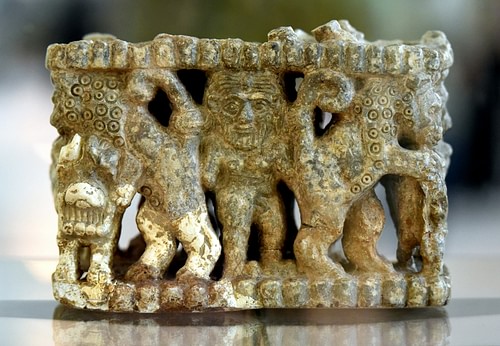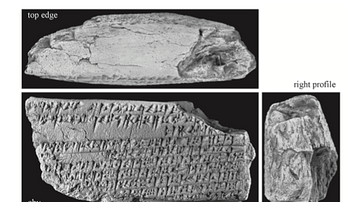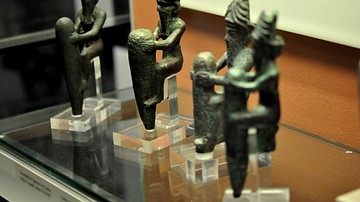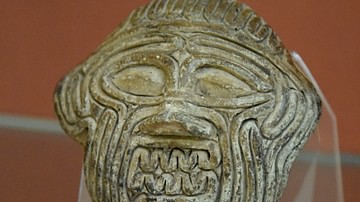Gilgamesh, Enkidu, and the Netherworld is a Sumerian poem pre-dating The Epic of Gilgamesh and featuring its central characters. It is sometimes included in modern-day translations as Book 12 but is usually omitted as it does not fit the narrative form of the epic's storyline. It is famous for its depiction of souls in the afterlife.
Scholar Jeremy Black claims the precise dating of the poem is not possible (as do others), while scholar Alhena Gadotti maintains it dates from the Ur III Period (2047-1750 BCE or, according to Gadotti's calculations of high chronology, c. 2100-2000 BCE). The poem is similar in vision to The Death of Ur-Nammu dated to the reign of Shulgi of Ur (2029-1982 BCE) of the Ur III Period. It is one of five Sumerian works featuring Gilgamesh which were eventually collected and synthesized in writing the epic c. 2150-1400 BCE. Scholar Stephanie Dalley gives these as:
- Gilgamesh, Enkidu, and the Netherworld (also known as Gilgamesh and the halub tree)
- Gilgamesh and Huwawa
- Gilgamesh and the Bull of Heaven
- The Death of Gilgamesh
- The Flood Story (Eridu Genesis and, modified, the Atrahasis)
The piece is usually omitted from modern translations, which deal with the standard Babylonian text of eleven tablets, because Enkidu dies in Tablet 7, sending Gilgamesh off on his quest for the meaning of life that makes up the rest of the story. Enkidu's sudden reappearance in Tablet 12 then makes no sense unless, as some scholars have claimed, he is a ghost. This claim is not supported by the text, however.
The beginning of the piece, where the god Enki is battered by a storm in his boat, is similar to a famous scene in The Myth of Adapa while the incident involving the goddess Inanna and the halub tree is the same story told in the poem Inanna and the Huluppu Tree. The unique section of the piece is lines 151-303, in which two magical objects loved by Gilgamesh fall into the underworld and Enkidu goes to retrieve them. His report on the souls in the dark realm is considered one of the earliest imaginative visions of the Mesopotamian afterlife.
Summary & Commentary
The poem opens in an indeterminate time of long ago, "In those days, in those distant days, in those nights, in those remote nights, in those years, in those distant years" when the gods had divided their realms – An (Anu) the sky, Enlil the earth, Ereshkigal the netherworld – and moves quickly to the action of Enki, god of wisdom, navigating his boat through a storm. The storm winds uproot a halub tree, which Inanna brings to her city of Uruk and plants, hoping to turn it into furniture once it has matured (lines 1-35).
Once it has grown, a snake, bird, and demon-maid take up residence in the tree, preventing Inanna from harvesting it, and she appeals to her brother Utu-Shamash, the sun god, for help, but he refuses (lines 36-90). She then asks her brother Gilgamesh, and he kills the snake, drives off the others, cuts down the tree for her, and fashions two magical items for himself – the ellag and the ekidma – which are undefined (lines 91-150). Scholar Samuel Noah Kramer was the first to suggest they are a war drum and drumsticks.
Gilgamesh loves his ellag and ekidma and plays with them in the town square, exhausting the youth of the city who have to play with him which, in Kramer's interpretation, is interpreted as Gilgamesh calling them to arms and making war to "praise himself." The women – mothers, widows, and sisters – complain to the gods, and the items fall into the netherworld. Gilgamesh tries to reach them but cannot, and so Enkidu, given here as his servant, volunteers and Gilgamesh gives him strict instructions on how he should behave once there (lines 151-204).
Lines 205-303 relate how Enkidu ignores these directions, does the exact opposite, and is held in the netherworld. Gilgamesh appeals to Enlil, who ignores him, and then to Enki, who commands Utu-Shamash to bring Enkidu back up. Once he returns to the world, he tells Gilgamesh what he has seen below in a dialogue that would have served, in part, to encourage cultural values, such as marriage and many children, but is largely a dismal vision of the fate of the souls of the dead except for stillborn children, who "play at a table of gold and silver, laden with honey and ghee" (line 297). The piece, as far as its extant form goes, ends with the fate of those who burn to death and have no afterlife at all as they have turned to smoke.
The Text
The following passage comes from The Literature of Ancient Sumer, translated by Jeremy Black et al. In the interests of space, this excerpt begins at line 91. Ellipses indicate missing words or sentences and question marks an alternate translation of a word or phrase.
91-113: When dawn was breaking, when the horizon became bright, when the little birds, at the break of dawn, began to clamour, when Utu had left his bedchamber, his sister holy Inanna said to the warrior Gilgamesh: "My brother, in those days when destiny was determined, when abundance overflowed in the Land, when An had taken the heavens for himself, when Enlil had taken the earth for himself, when the nether world had been given to Ereshkigal as a gift; when he set sail, when he set sail, when the father set sail for the nether world, when Enki set sail for the nether world – against the lord a storm of small hailstones arose, against Enki a storm of large hailstones arose. The small ones were light hammers, the large ones were like stones from catapults (?). The keel of Enki's little boat was trembling as if it were being butted by turtles, the waves at the bow of the boat rose to devour the lord like wolves and the waves at the stern of the boat were attacking Enki like a lion."
114-122: "At that time, there was a single tree, a single halub tree, a single tree (?), growing on the bank of the pure Euphrates, being watered by the Euphrates. The force of the south wind uprooted it and stripped its branches, and the Euphrates picked it up and carried it away. I, a woman, respectful of An's words, was walking along; I, a woman, respectful of Enlil's words, was walking along, and took the tree and brought it into Uruk, into Inanna's luxuriant garden."
123-133: "The woman planted the tree with her feet, but not with her hands. Inanna watered it using her feet but not her hands. She said: 'When will this be a luxuriant chair on which I can take a seat?' She said: 'When will this be a luxuriant bed on which I can lie down?' Five years, ten years had gone by, the tree had grown massive; its bark, however, did not split. At its roots, a snake immune to incantations made itself a nest. In its branches, the Anzud bird settled its young. In its trunk, the phantom maid built herself a dwelling, the maid who laughs with a joyful heart. But holy Inana cried!"
134-135: In the matter which his sister had told him about, her brother, the warrior Gilgamesh, stood by her.
136-150: He strapped his ... belt of 50 minas weight to his waist – 50 minas were to him as 30 shekels. He took his bronze axe used for expeditions, which weighs seven talents and seven minas, in his hand. He killed the snake immune to incantations living at its roots. The Anzud bird living in its branches took up its young and went into the mountains. The phantom maid living in its trunk left (?) her dwelling and sought refuge in the wilderness. As for the tree, he uprooted it and stripped its branches, and the sons of his city, who went with him, cut up its branches and bundled them. He gave it to his sister holy Inanna for her chair. He gave it to her for her bed. As for himself, from its roots, he manufactured his ellag and, from its branches, he manufactured his ekidma.
151-165: He played ellag in the broad square, never wanting to stop playing it, and he praised himself in the broad square, never wanting to stop praising himself. For (?) him who made the team of the widows' children ..., they lamented: "O my neck! O my hips!" For those that had a mother, the mother brought bread for her son; for those that had a sister, the sister poured water for her brother. As the evening came, he marked the spot where the ellag had been placed, and he picked up his ellag from in front of him and took it home. But early in the morning as he ... the place marked, the widows' accusation and the young girls' complaint caused his ellag and his ekidma to fall down to the bottom of the nether world. He tried with his hand but could not reach them, tried with his foot but could not reach them.
166-175: At the gate of Ganzer, in front of the nether world, he sat down. Gilgamesh wept, crying bitterly: "O my ellag! O my ekidma! O my ellag, I am still not satiated with its charms, the game with it has not yet palled for me! If only my ellag waited still in the carpenter's house for me! I would treat the carpenter's wife like my own mother – if only it waited still there for me! I would treat the carpenter's child like my little sister – if only it waited still there for me! My ellag has fallen down to the nether world – who will retrieve it for me? My ekidma has fallen down to Ganzer – who will retrieve it for me?"
176-179: His servant Enkidu answered "My king, you weep; why does your heart worry? Today I shall retrieve your ellag from the nether world, I shall retrieve your ekidma from Ganzer."
180-183: Gilgamesh answered Enkidu: "If today you are going to go down to the nether world, let me advise you! My instructions should be followed. Let me talk to you! Pay attention to my words!"
184-198: "You should not put on your clean garments: they would recognise immediately that you are alien. You should not anoint yourself with fine oil from a bowl: they would surround you at its scent. You should not hurl throw-sticks in the nether world: those struck down by the throw-sticks would surround you. You should not hold a cornel-wood stick in your hand: the spirits would feel insulted by you. You should not put sandals on your feet. You should not shout in the nether world. You should not kiss your beloved wife. You should not hit your wife even if you are annoyed with her. You should not kiss your beloved child. You should not hit your son even if you are annoyed with him. The outcry aroused would detain you in the nether world."
199-204: "She who lies there, she who lies there, Ninazu's mother who lies there – her pure shoulders are not covered with a garment, and no linen is spread over her pure breast. She has fingers like a pickaxe, she plucks her hair out like leeks."
205-220: Enkidu, however, did not heed his master's words. He put on his clean garments, and they recognised that he was alien. He anointed himself with fine oil from a bowl and they surrounded him at its scent. He hurled throw-sticks in the nether world and those struck down by the throw-sticks surrounded him. He held a cornel-wood stick in his hand and the spirits felt insulted by him. He put sandals on his feet. He caused irritation in the nether world. He kissed his beloved wife and hit his wife when he was annoyed with her. He kissed his beloved child and hit his son when he was annoyed with him. He aroused an outcry and was detained in the nether world.
221-228: Warrior Gilgamesh, son of Ninsumun, directed his steps on his own to E-kur, the temple of Enlil. He cried before Enlil: "Father Enlil, my ellag fell down into the nether world, my ekidma fell down into Ganzer. Enkidu went down to retrieve them, but the nether world has seized him. Namtar did not seize him, the Asag did not seize him; but the nether world has seized him. The udug demon of Nergal, who spares nobody, did not seize him, but the nether world has seized him. He did not fall in battle on the field of manhood, but the nether world has seized him."
229: Father Enlil did not stand by him in the matter, so he went to Eridu.
230-236: In Eridu, he directed his steps on his own to the temple of Enki. He cried before Enki: "Father Enki, my ellag fell down into the nether world, my ekidma fell down into Ganzer. Enkidu went down to retrieve them, but the nether world has seized him. Namtar did not seize him, the Asag did not seize him; but the nether world has seized him. The udug demon of Nergal, who spares nobody, did not seize him, but the nether world has seized him. He did not fall in battle on the field of manhood, but the nether world has seized him."
237: Father Enki stood by him in this matter.
238-242: He said to the young warrior Utu, the son born by Ningal: "Open a hole in the nether world immediately, and then bring up his servant from the nether world!" He opened a hole in the nether world and brought up his servant with his breeze (?) from the nether world.
243-246: They hugged and kissed. They wearied each other with questions: "Did you see the order of the nether world? – If only you would tell me, my friend, if only you would tell me!"
247-252: "If I tell you the order of the nether world, sit down and weep! I shall sit down and weep! ..., which your heart rejoiced to touch, is ..., worms infest it like an old garment (?); like ... of (?) a crevice, it is full of dust."
253: "Alas!" he said and sat down in the dust.
254-267: "Did you see him who had one son?"
"I saw him."
"How does he fare?"
"He weeps bitterly at the wooden peg which was driven into his wall."
"Did you see him who had two sons?"
"I saw him."
"How does he fare?"
"He sits on a couple of bricks, eating bread."
"Did you see him who had three sons?"
"I saw him."
"How does he fare?"
"He drinks water from a saddle waterskin."
"Did you see him who had four sons?"
"I saw him."
"How does he fare?"
"His heart rejoices like a man who has four asses to yoke."
"Did you see him who had five sons?"
"I saw him."
"How does he fare?"
"Like a good scribe he is indefatigable, he enters the palace easily."
"Did you see him who had six sons?"
"I saw him."
"How does he fare?"
"He is a cheerful as a ploughman."
"Did you see him who had seven sons?"
"I saw him."
"How does he fare?"
"As a companion of the gods, he sits on a throne and listens to judgments."
268-285: "Did you see the palace eunuch?"
"I saw him."
"How does he fare?"
"Like a useless alala stick he is propped in a corner."
"Did you see the woman who never gave birth?"
"I saw her."
"How does she fare?"
"Like a ... pot, she is thrown away violently, she gives no man joy."
"Did you see the young man who never undressed his wife?"
"I saw him."
"How does he fare?"
"You finish a rope, and he weeps over the rope."
"Did you see the young woman who never undressed her husband?"
"I saw her."
"How does she fare?"
"You finish a reed mat, and she weeps over the reed mat."
"Did you see him who had no heir?"
"I saw him."
"How does he fare?"
"Like him who ... bricks (?), he eats bread."
"...?" "I saw him."
"How does he fare?"
7 lines fragmentary or missing286-303: "Did you see ...?"
"His food is set apart, his water is set apart, he eats the food offered (?) to him, he drinks the water offered (?) to him."
"Did you see the leprous man?"
"He twitches like an ox as the worms eat at him."
"Did you see him who fell in battle?"
"I saw him."
"How does he fare?"
"His father and mother are not there to hold his head, and his wife weeps."
"Did you see the spirit of him who has no funerary offerings?"
"I saw him."
"How does he fare?"
"He eats the scraps and the crumbs ... tossed out in the street."
"Did you see him hit by a ship's board? How does he fare?"
"'Alas, my mother!' the man cries to her, as he pulls out the ship's board ..., he ... cross beam ... crumbs."
"Did you see my little stillborn children who never knew existence?"
"I saw them."
"How do they fare?"
"They play at a table of gold and silver, laden with honey and ghee."
"Did you see him who died ...?"
"I saw him."
"How does he fare?"
"He lies on a bed of the gods."
"Did you see him who was set on fire?"
"I did not see him. His spirit is not about. His smoke went up to the sky."











